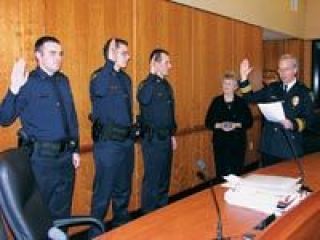ARLINGTON The Arlington Police Department commissioned three new reserve officers at its annual meeting Feb. 21, swearing them in three days before they graduated from the Basic Law Enforcement Reserve Academy at Skagit Valley College.
Officer Curtis Hirotaka, team leader of the reserve officers, recognized Arlington Capital Projects Manager Paul Ellis for his four years of service to date as a reserve and provisional officer with the Arlington Police Department, before introducing incoming Reserve Officers Seth Kinney, David Meister and Shaun Murray to the public.
Each reserve officer hails from a different background. Kinney is already a Sauk-Suiattle Tribal Police Officer, while Meister works in the Washington State Department of Fish and Wildlifes Marine Resource Management. Murray acts as an Everett Mall Security Supervisor. However, Hirotaka explained that all three new reserve officers completed the same training.
Hirotaka clarified that a full-time officer is a paid employee, while a reserve officer volunteers his time in exchange for experience. Reserve officers only have full arrest powers while on duty in their given jurisdictions.
They resemble full-time officers and, side by side, theres virtually no difference, Hirotaka said. They drive the same cars, attend the same training and wear the same uniforms. They even carry the same firearms and have all of the necessary equipment that full-time officers are issued.
The most obvious differences between full-time and reserve officers are in training. Full-time officers receive a year of field training and more than 700 hours of extensive training in other areas. Reserve officers receive 14 weeks of field training, to familiarize them with the geography and call loads of the city and a minimum of 285 hours of extensive training in those areas, which include first aid, patrol procedures, criminal procedures, criminal law, traffic investigation and crime scene investigation.
All three incoming reserve officers thanked their families and employers for making allowances during this training period of five and a half months. The training also included an initial interview, two ride-alongs with either a master patrol officer or a field training officer, an oral board interview, a strict physical assessment test, an intensive background investigation, a polygraph test, a psychological examination and a final interview with Arlington Police Chief John Gray.
If an applicant fails any portion of these testing phases, hes eliminated from the rest of the process, Hirotaka said. To find three reserve officers who could successfully complete each phase of the testing process, I had 35 subjects who began phase one, which means that only 11.666 percent made it.
The reserve officers themselves cited many of the same reasons for joining the program.
For Kinney, who did a six-year stint as a Snohomish County Sheriffs Office Explorer before attending more than 700 hours of training at the Bureau of Indian Affairs Academy in New Mexico, taking on the additional duties of a reserve officer with the Arlington Police Department is merely a means of continuing his career as a police officer.
Its not really that much time, Kinney said of the minimum of 16 hours that he and his fellow reserve officers will each volunteer per month. Im working in two separate jurisdictions now, but when Im on duty, Im on duty. My schedule allows me a few days off during some weeks.
Meister and Murray are not only balancing their volunteer service with full-time jobs like Kinney, but also with wives and children. Meister, a father of two with a third on the way, is interested in possibly moving into the law enforcement end of the Department of Fish and Wildlife. He believes he could benefit from direct experience in the law enforcement field, before he commits to such a step.
This way, I get to look into it and see if its what I want to do, Meister said. I like law and order, and I think people should be honest.
Murrays family is one of the reasons that he became a reserve officer in the first place, since his father was a firefighter, his grandfather was a Washington State Patrol Officer and his great-grandfather was a Snohomish County Sheriffs Deputy.
Theres a long history of civil service in my family, said Murray, whos also a member of the South Everett Business Watch Crime Prevention Program. Plus, I enjoy dealing with the public and gaining this experience.
Murray and Meister agreed that the time spent apart from their families during training has been difficult, but they echoed Kinneys appreciation for the friendship, brotherhood and teamwork that theyve encountered as police officers.
Everyone has welcomed us, Meister said. Even before wed ridden along, we were so well-received. Were all dedicated to our communities. Thats why we got into this profession.
Were people too, Kinney said. We do what we can, and were here to help.
Arlington Police induct three new reserve officers
ARLINGTON The Arlington Police Department commissioned three new reserve officers at its annual meeting Feb. 21, swearing them in three days before they graduated from the Basic Law Enforcement Reserve Academy at Skagit Valley College.








